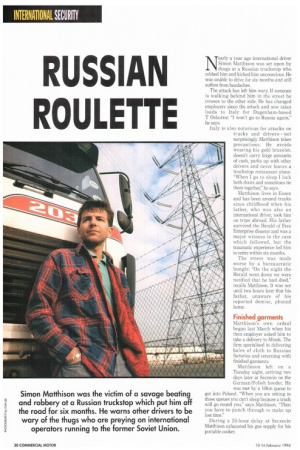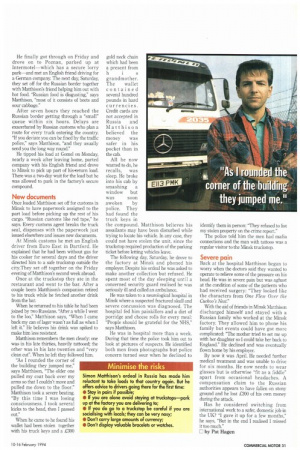RUSSIAN ROULETT
Page 32

Page 33

If you've noticed an error in this article please click here to report it so we can fix it.
Nearly a year ago international driver Simon Matthison was set upon by thugs at a Russian truckstop who robbed him and kicked him unconscious. He was unable to drive for six months and still suffers from headaches.
The attack has left him wary If someone is walking behind him in the street he crosses to the other side. He has changed employers since the attack and now takes loads to Italy for Dagenham-based T Osborne: "I won't go to Russia again," he says.
Italy is also notorious for attacks on trucks and drivers—not surprisingly Matthison takes precautions. He avoids wearing his gold bracelet, doesn't carry large amounts of cash, parks up with other drivers and never leaves a truckstop restaurant alone. -When I go to sleep I lock both doors and sometimes tie them together," he says.
Matthison lives in Essex and has been around trucks since childhood when his father, who was also an international driver, took him on trips abroad. His father survived the Herald of Free Enterprise disaster and was a major witness in the case which followed, but the traumatic experience led him to retire within six months.
The stress was made worse by a bureaucratic bungle: "On the night the Herald went down we were notified that he had died," recalls Matthison. It was not until two hours later that his father, unaware of his reported demise, phoned home.
Finished garments
Matthison's own ordeal began last March when his then employer asked him to rake a delivery to Minsk. The firm specialised in delivering bales of cloth to Russian factories and returning with finished garments.
Matthison left on a Tuesday night, arriving two days later at Szczecin on the German/Polish border. He was met by a lOkm queue to gct into Poland. "When you are sitting in those queues you can't sleep because a truck will go round you," says Matthison. "Then you have to punch through to make up lost time."
During a 25-hour delay at Szczecin Matthison exhausted his gas supply for his portable cooker. He finally got through on Friday and drove on to Poznan, parked up at Intermotel—which has a secure lorry park—and met an English friend driving for a German company. The next day, Saturday, they set off for the Russian border together with Matthison's friend helping him out with hot food, "Russian food is disgusting," says Matthison, "most of it consists of beets and sour cabbage."
After seven hours they reached the Russian border getting through a "small" queue within six hours. Delays are exacerbated by Russian customs who plan a route for every truck entering the country. "If you deviate you can be fined by the traffic police," says Matthison, "and they usually send you the long way round," He tipped his load at Gomel on Monday, nearly a week after leaving home, parted company with his English friend and drove to Minsk to pick up part of his•return load. There was a two-day wait for the load but he was allowed to park in the factory's secure compound.
New documents
Once loaded Matthison set off for customs in Minsk to have paperwork assigned to the part load before picking up the rest of his cargo. "Russian customs like red tape," he says. Every customs agent breaks the truck seal, dispenses with the paperwork just issued elsewhere and issues new documents.
At Minsk customs he met an English driver from Euro East in Dartford. He explained that he had been without gas for his cooker for several days and the driver directed him to a safe truckstop outside the city.They set off together on the Friday evening of Matthison's second week abroad.
Once at the truckstop they ate in the restaurant and went to the bar. After a couple beers Matthison's companion retired to his truck while he fetched another drink from the bar.
When he returned to his table he had been joined by two Russians. "After a while I went to the loo," Matthison says, "When I came back my can of lager wasn't as full as when I left it." He believes his drink was spiked to make him less resistant.
Matthison remembers the men clearly: one was in his late thirties, heavily tattooed; the other was in his late twenties and "very clean cut", When he left they followed him.
"As I rounded the corner of the building they jumped me," says Matthison, "The older one pulled my coat back over my arms so that I couldn't move and pulled me down to the floor." Matthison took a severe beating. "By this time I was losing consciousness. I took several kicks to the head, then I passed out."
When he came to he found his wallet had been stolen together with his truck keys and a DOD gold neck chain which had been a present from grandmother.
The wallet contained several hundred pounds in hard currencies. Credit cards are not accepted in Russia and Matthison believed the money was safer in his pocket than in the cab.
All he now wanted to do, he recalls, was sleep. He broke into his cab by smashing a window but was soon awoken by police. They had found the truck keys in the compound. Matthison believes his assailants may have been disturbed while trying to locate his vehicle. In any case, they could not have stolen the unit, since the truckstop required production of the parking ticket before letting vehicles leave.
The following day, Saturday, he drove to the factory at Minsk and phoned his employer. Despite his ordeal he was asked to make another collection but refused. He spent most of the day sleeping until a concerned security guard realised he was seriously ill and called an ambulance.
He was taken to a neurological hospital in Minsk where a suspected fractured skull and severe concussion was diagnosed. The hospital fed him painkillers and a diet of porridge and cheese rolls for every meal: "People should be grateful for the NHS," says Matthison.
He was in hospital more than a week. During that time the police took him out to look at pictures of suspects. He identified both men from photographs but police concern turned sour when he declined to identify them in person: "They refused to list my stolen property on the crime report."
The police told him the men had mafia connections and the man with tattoos was a regular visitor to the Minsk truckstop.
Severe pain
Back at the hospital Matthison began to worry when the doctors said they wanted to operate to relieve some of the pressure on his head. He was in severe pain but was aghast at the condition of some of the patients who had received surgery: "They looked like the characters from One Flew Over the Cuckoo's Nest."
With the aid of friends in Minsk Matthison discharged himself and stayed with a Russian family who worked at the Minsk factory. They allowed him to phone his family but events could have got more complicate& "The mother tried to set me up with her daughter so I could take her back to England." lie declined and was eventually flown home by his employer.
By now it was April. He needed further medical treatment and was unable to drive for six months. He now needs to wear glasses but is otherwise "fit as a fiddle" apart from occasional headaches. A compensation claim to the Russian authorities appears to have fallen on stony ground and he lost £200 of his own money during the attack.
Has he considered switching from international work to a safer, domestic job in the UK? "I gave it up for a few months," he says, "But in the end I realised I missed it too much."
El by Pat Hagen




















































































